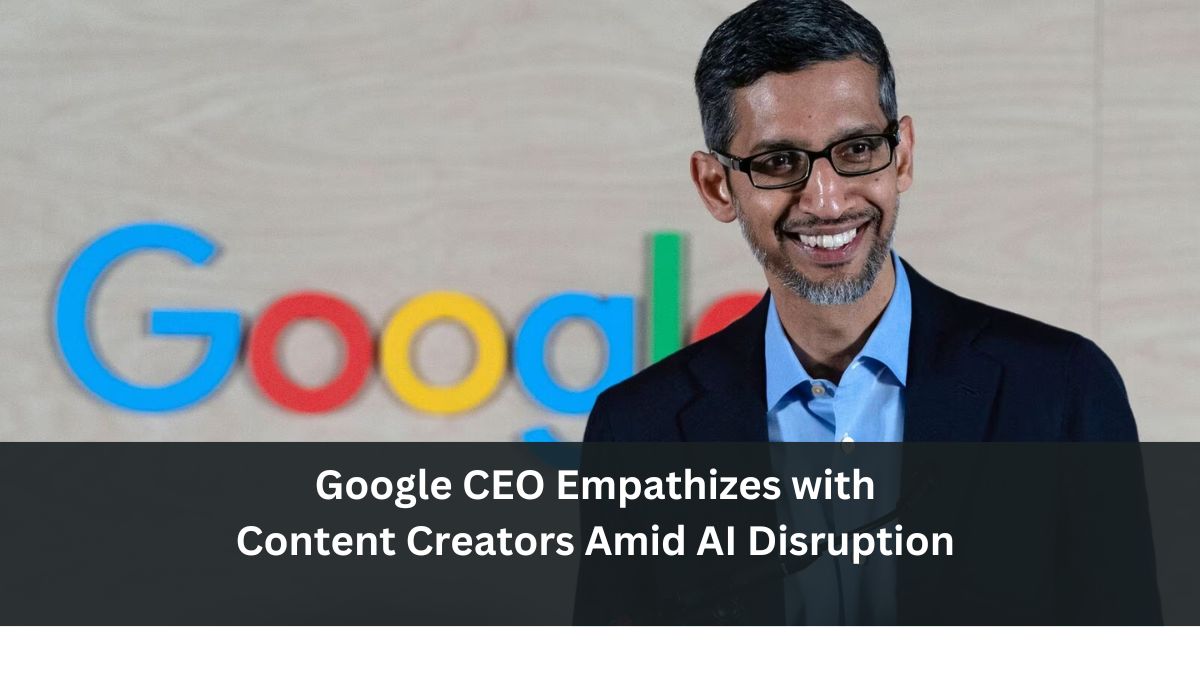Ad Tech
Google CEO Empathizes with Content Creators Amid AI Disruption

The Rapidly Evolving Search Landscape
In a recent interview, Alphabet and Google CEO Sundar Pichai acknowledged the transformative impact of artificial intelligence on the world of search and content creation. As Google rolls out AI-powered features like Overviews, many content creators are grappling with the reality of their websites experiencing significant drops in traffic from the search giant. Pichai described this as a “disruptive moment” akin to past shifts like the transition from desktop to mobile and the introduction of featured snippets.
While Pichai expressed optimism about the potential for AI to drive more traffic and engagement, he also recognized the valid concerns of content creators whose livelihoods depend on their online presence. “I understand the sentiment,” he said. “It’s a big change. These are disruptive moments. AI is a big platform shift. People are projecting out, and people are putting a lot into creating content. It’s their businesses.”
The Plight of Individual Content Creators
When pressed about specific examples of websites losing 90% or more of their Google traffic, such as HouseFresh and Retro Dodo, Pichai emphasized the difficulty in addressing individual cases. He pointed out that Google aims to satisfy user expectations at scale, and that it’s not always clear if a decline in traffic for one site represents a broader trend.
Pichai drew an analogy to the restaurant industry, suggesting that a single restaurant experiencing a drop in customers doesn’t necessarily mean people have stopped eating out altogether. Instead, he posited that new competition or shifting consumer preferences could be at play. He also touched on the complex dynamics between smaller content creators and aggregator sites, questioning whether traffic should flow to the original source or intermediaries.
Empathy and the YouTube Parallel
In a thought-provoking moment, the interviewer turned the tables on Google, asking Pichai how he felt when OpenAI used over a million hours of YouTube videos to train its GPT-4 model without permission. This scenario mirrors Google’s own practice of indexing millions of websites for its search engine.
Pichai responded with empathy, acknowledging the emotional impact of such transformations on content creators, artists, and website owners. “I can understand how emotional a transformation this is,” he said. “The way we have taken that approach in many of these cases is to put the creator community as much at the center of it as possible. We’ve long done that with YouTube.”
He expressed his belief that over time, platforms that better support and empower content creators will emerge as winners in the AI era. “Through this AI moment, over time, there’ll be players who will do better by the content creators that support their platforms, and whoever does it better will emerge as the winner,” Pichai stated.
The Future of Search and the Web
Looking ahead, Pichai shared his vision for the future of search and the web. He emphasized the importance of creating high-quality, valuable content that goes beyond mass-produced AI-generated material. “Using AI to produce content en masse without adding any value is not what users are looking for,” he said.
Pichai also touched on the ongoing efforts of Google’s search quality team to adapt ranking systems to better identify and surface high-quality content in the face of AI-generated content. He expressed confidence that over the next decade, platforms that excel at sifting through the noise and delivering value to users will come out on top.
When asked about the web’s trajectory over the next five years, Pichai painted a picture of a richer, more multimodal, and interactive online experience. He envisioned a web that better encapsulates the full range of human information consumption, moving beyond the current siloed approach of webpages and separate platforms like YouTube.
Pichai also highlighted the potential for AI to enable dynamic, personalized user interfaces tailored to individual needs and preferences. While acknowledging the risk of AI being used to generate spam, he remained optimistic about the innovative ways entrepreneurs will harness the technology to create groundbreaking new experiences.
Navigating the AI Revolution
As the world of search and content creation continues to evolve at a breakneck pace, Google finds itself at the forefront of an AI revolution that is both exhilarating and disruptive. While Sundar Pichai’s empathy for content creators is commendable, the full impact of AI on the web ecosystem remains to be seen.
Content creators, large and small, will need to adapt and innovate to thrive in this new landscape. By focusing on delivering unique value, embracing emerging technologies, and cultivating strong relationships with their audiences, they can navigate the challenges and opportunities presented by the AI era.
As for Google, the search giant will need to strike a delicate balance between harnessing the power of AI to enhance the user experience and supporting the diverse ecosystem of content creators that form the backbone of the web. How it manages this balance will likely shape the future of search and the internet as we know it.
